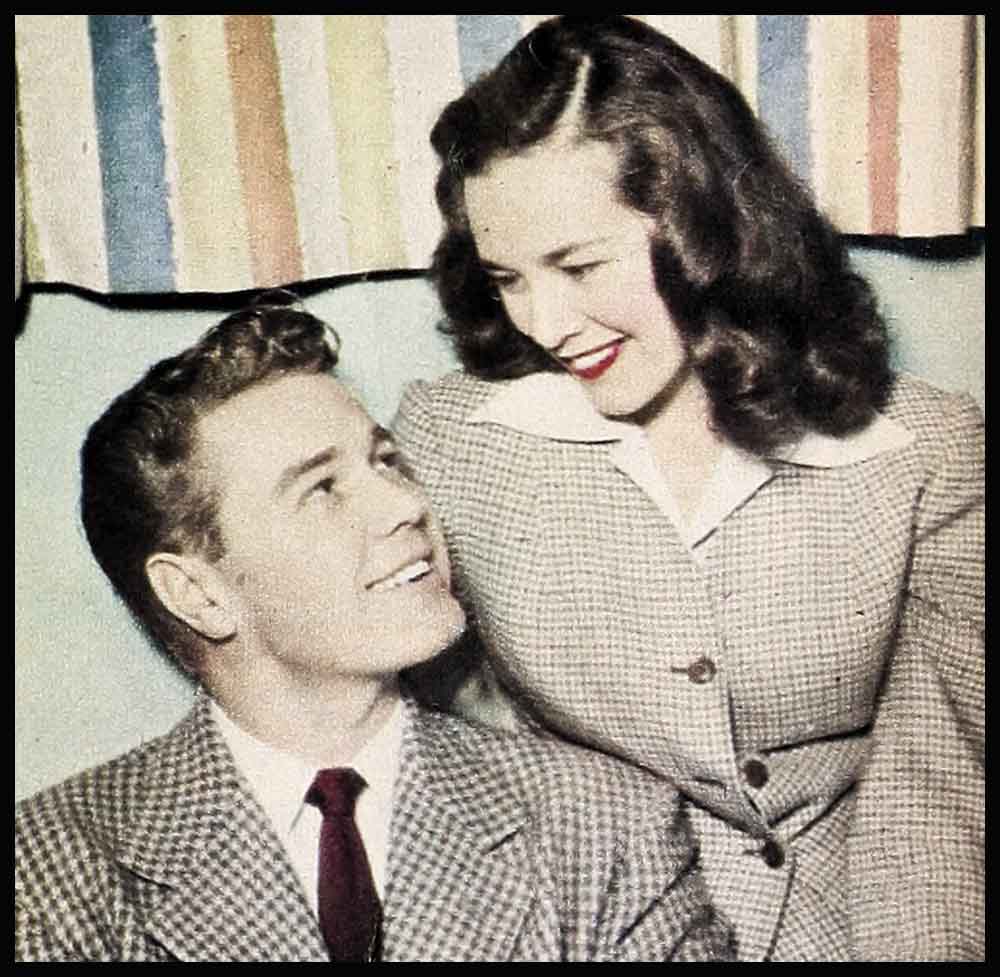
Time Out For Love
Little did the neighbors in Hollywood’s Laurel Canyon suspect that the minute but fetching guest house, standing in the rear of the estate with the big iron gate, had overnight become a honeymoon house. A hidden honeymoon house at that—not the house, of course, but the honeymoon. For there were reasons why the Richard Cranes weren’t telling the world of their three-hour-old marriage.
It all began over a year ago when Dick dropped into Victor’s—a steak house on Sunset Boulevard. Not only was the food good at Victor’s—so was the conversation. In addition, it lay on the direct route between Dick’s canyon house and the studio.
AUDIO BOOK
This particular evening, Dick sauntered in without the slightest premonition that he was about to undergo an experience that would alter his entire life. The first person he noticed was his agent, Bert Marx, who is also one of Dick’s best friends.
“Hi, Bert,” said Dick. Then he rounded the booth and noted that Mr. Marx’s companion was a pretty girl. Pretty in the Western manner as opposed to the Hollywood version, which is to say that she was not heavily made up, her eyelashes—though impressively long—were her own, and her hair fell in long, unstudied grace over her shoulders.
“How about joining us?” asked Bert. Dick didn’t exactly leap at the chance. After all, he had dated some luscious lassies during the past several years. But there was something about this girl. . . .
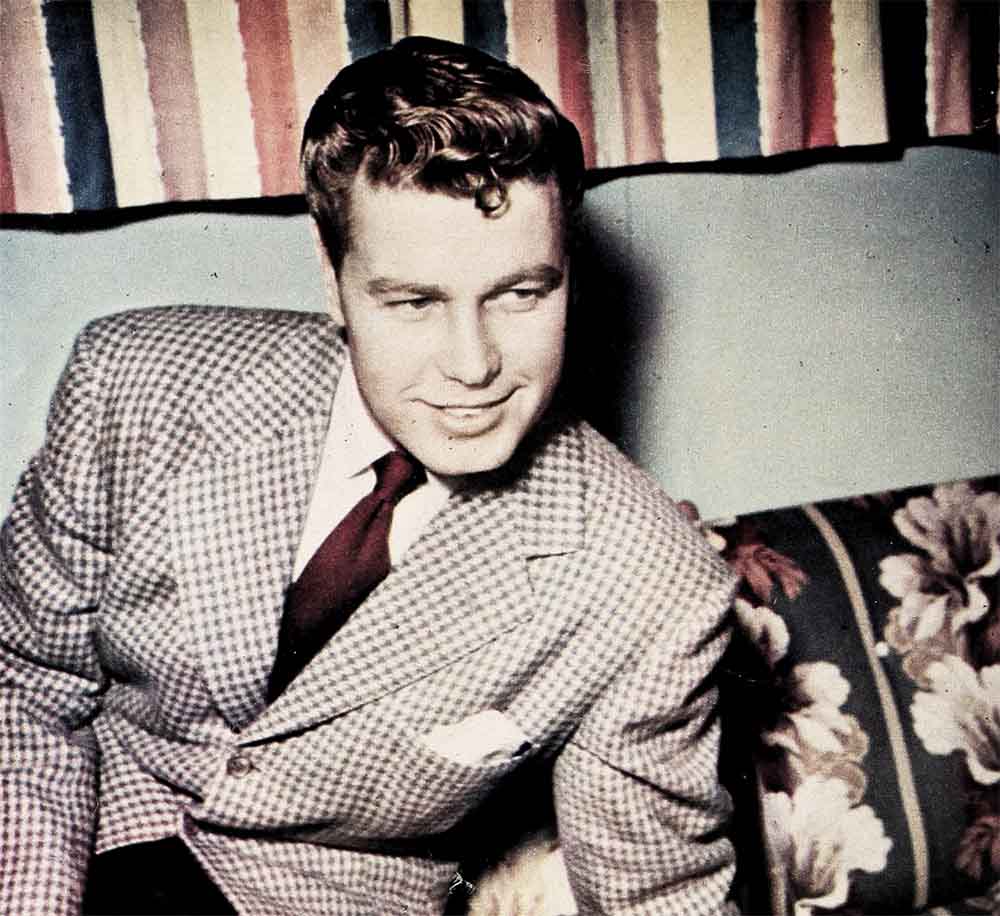
“Miss Kay Morley, Mr. Richard Crane,” said Bert Marx. “Kay, would you mind if I went over a few things with Dick?”
“Not at all,” said Kay. And during the dinner she didn’t speak more than six sentences.
After ward, Dick mused about this. She hadn’t ventured one unsolicited opinion. She hadn’t table-hopped; nor had she called anyone over to the table. She had been merely quiet. There are, of course, said Dick to himself, two kinds of quiet—one that results from having nothing to say, and the other produced by poise and intellect. He decided then and there that Miss Morley came under the latter classification—and made a note to find out what made her tell time without even ticking.
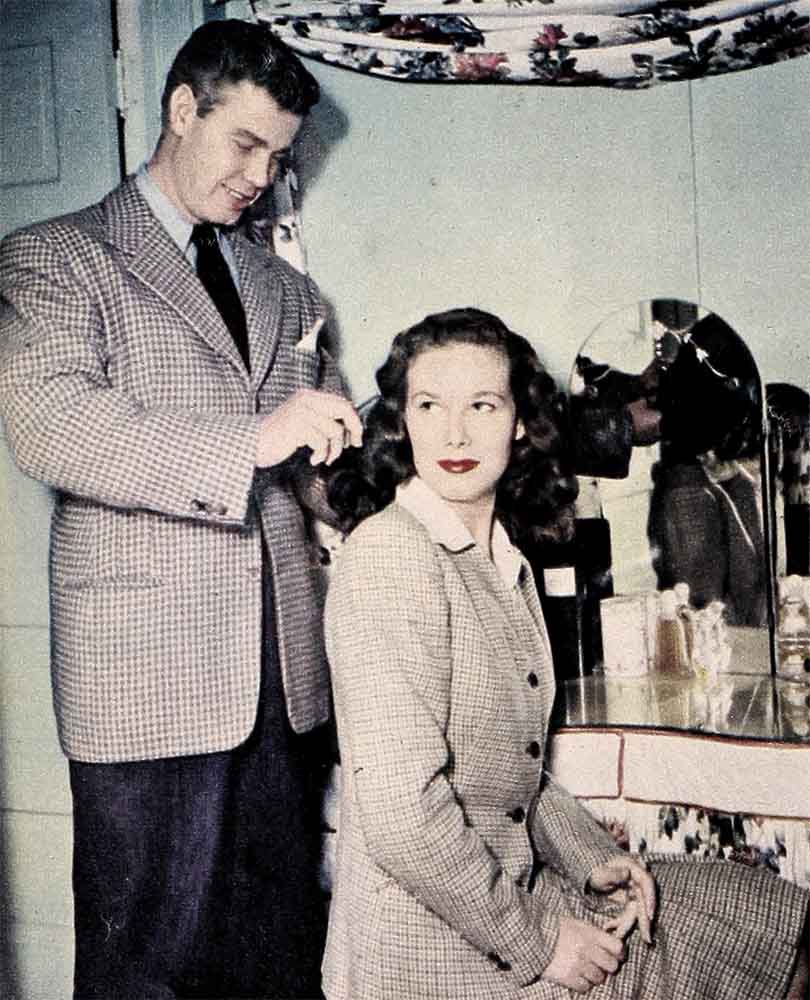
On the other hand, Kay Morley was thinking that Richard Crane was an unusual type of man to be in the acting business. He was without pose or pretense. There weren’t two points worth of ham in his entire system. He looked like a champion athlete, which he had been. He looked like a nice boy, working his way through college by hashing in a drive-in, or like a filling station attendant with a string of steady customers, or like a truck driver with a perfect safety record—all of which he had been. But he didn’t seem to want to remind people in his off-hours that his profession was creating illusions. Hmmm, thought Kay.
So, three or four weeks later, she was having dinner with her brother, a handsome chap in uniform, when Dick Crane again entered Victor’s. It wasn’t exactly because Kay knew that Dick frequented the place that she had selected it when her brother asked her to name a dinner spot. It was because the food was so good. At least that’s what Kay told herself.
However, when Dick caught sight of his fellow Marx client practically surrounded by a very big, very good-looking man, he bowed formally and moved on to another table. A crisis! Luckily, a casual friend of Kay’s lounged into view, giving her an opportunity to call out, “Oh, Eddie, won’t you join us? I want you to meet my brother!”
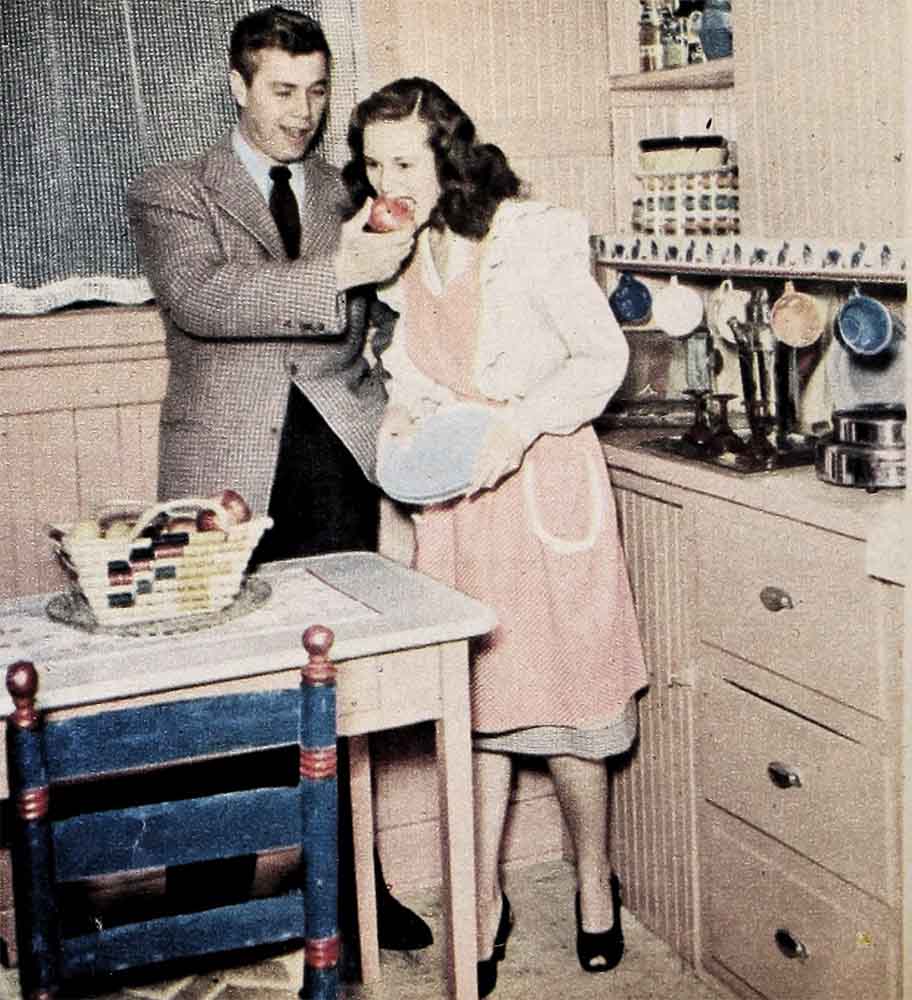
Wonderful word, brother! Dick caught it as a starving hobo would reach for a piece of angel-food cake and presently eased over to the Morley booth. It was then that he learned that Kay Morley was really Leona Elaine Lenore deVinna. She had grown up in Long Beach with her parents and a family of brothers, all big, tall and critical of their sister’s boy friends.
However, this particular brother said, as he was leaving Kay that night, “Say, that Crane isn’t a bad guy at all. Seems okay.” From a deVinna this was like being presented with oak leaf clusters.
That did it! Kay and Dick started dating. Then came the hurdle of passing the deVinna scrutiny. Many a young man had fallen by the wayside at this point, for the deVinnas, though charming and cordial, were also placid and silent—two ( qualities which had proved the undoing of more than one of Kay’s aspiring beaux. They arrived at Kay’s apartment one day and so did Mr. Crane.
Dick, having always been one of his mother’s best friends, felt no shyness toward people who were her contemporaries. He marched in, shook hands, and asked Mr. deVinna about business conditions in Long Beach. Then he asked Mrs. deVinna if she had the same trouble his mother had getting butter and bobby pins. The deVinnas beamed. They vied with one an. other to converse with this attractive young man who might have been, so far as conduct and character were concerned, one of their own sons. When the deVinnas left, they and Dick were fast friends. And Kay and Dick looked at each other again—and I faced another test.
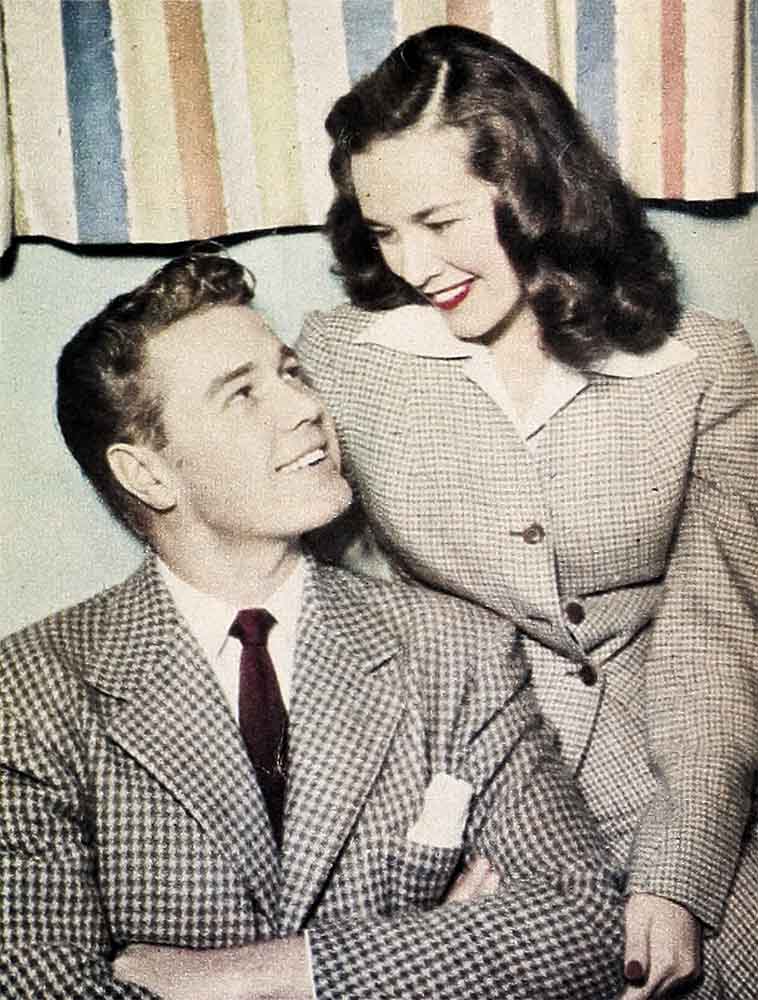
DICK’S father was killed in France during the first world war just a month after Dick was born. Naturally, Dick and his mother grew up together; they were chums, confidantes, as well as mother and son. In many cases of that sort, the mother is unwilling to share her son.
But Dick’s mother was different. Mrs. Crane, who had already noted that Dick’s feminine conversation had narrowed down to the word “Kay,” suggested that Miss Morley be invited for dinner Sunday.
“Is there anything I should do, or not do?” asked Kay nervously, wanting terribly to make a good impression.
“Just be yourself and we’re set,” said Dick and kissed her.
Mrs. Crane and Kay had spent about twenty minutes together when it became plain to both that theirs was going to be a supremely happy relationship. “The one thing I’ve felt that I’ve missed in life is having a daughter,” Mrs. Crane confided. “Ah . . . please have another slice of this chocolate cake, Kay.”
“It’s wonderful. Could I have the recipe for it, please?” asked Kay.
Well, that settled it in Dick’s mind. There was now nothing to stand in the way of their getting married at once. Nothing—except Kay. She shook her dark head stubbornly. “Your career is just getting started, dear. The studio is building you up as a romantic leading man. If you get married now, everyone may lose interest in you. I won’t let you take the chance.”

Dick put up a good fight. Kay, so sweet, so near to him, was denying him marriage. “What about Alan Ladd, Ronald Reagan, Frank Sinatra, Bing Crosby?”
“I know, dear, but most of them were established before they married. No,” and she shook her head, “we must wait.”
Finally he agreed to her way.
They settled down into that rarest of all Hollywood vehicles: A long engagement. And they found it to be rare fun. Kay came up to Dick’s canyon house one day and looked it over with approval and an improving eye. “Drapes for the windows, some pictures,” she murmured.
The color schemes were good, they both decided—and went to work on giving the bachelor house a feminine touch. Dick decided that one thing definitely needed was a dressing room in the bedroom. He bought a rough-pine kidney table. He and Kay selected drapes for the backing of that wall space in a pattern that was matched by a ready-made flounce and top for the kidney table. Dick put foundation and fluff together. Presto! The feminine touch. They picked the white string rug out together, admitting it was impractical, but Kay thought it would give the room a sleek, modern look.
COR his birthday. Kay gave Dick a Maltese terrier which promptly presented him with five puppies. Although her pups had to remain in the back-yard doghouse, Muffins was allowed indoors. She was a puzzled pup, however.
Kay and Dick had memorized lines, scenes, entire acts of celebrated plays. One of their favorite scenes was the quarrel from “Private Lives.” Occasionally they enacted this with gusto, whereupon Muffins retired to the bedroom, lay doggo and peered around the door, or flattened herself as thin as tissue paper and crawfished under the lounge.
At other times Muffins sat on a chair, her head cocked on one side, her tongue lolling out, and beamed approval at the love scenes from “Coquette,” from “The Male Animal,” from “Holiday,” from “The Animal Kingdom,” or from “Kiss And Tell.”
Then Kay was awarded the lead in a Goldwyn picture, “Youth Aflame,” and Dick, as thrilled over it as Kay, set to work to coach her in the part. Under Dick’s persistent tutelage, gentle, sweet, soft-voiced Kay became—for camera purposes—a cross-grained, blatant juvenile-delinquent witch. Muffins was baffled.
Then last November, Dick was called into the head office and notified that he had been awarded the plum part of his life, that of Captain Cherry in the superb Rickenbacker story that is being screened as “Captain Eddie.”
He made a mad dash for Kay and before she could protest, they were headed for Santa Monica.
“What is this all about?” she finally managed when she caught her breath.
“We’re going to apply for our marriage license,” said masterful Mr. Crane. “We know we’re in love and that we’re going to be married sometime. I’ve just won the best role of my career, and I’m going to celebrate by marrying my girl.”
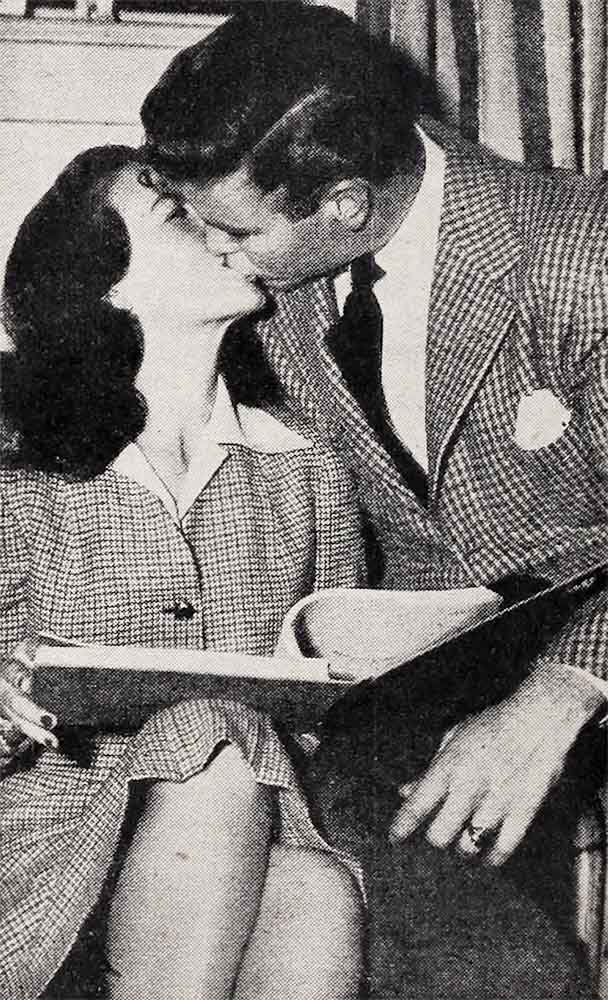
“I’ll marry you under one condition,” said the stubborn little Kay, “that we keep it secret until we’re positive that being married isn’t going to make any difference in your career.”
“Secret or otherwise, you’re going to marry me,” he told her.
Now, arranging a secret marriage between two Hollywood personalities is harder than surreptitiously burying an elephant. The fact that their license was taken out under the names of Elaine deVinna and Richard Crane helped some, but every day that the license was kicking around without being used made discovery more possible.
Yet, try to find time to be married! The day that Dick was to be free of the studio for an entire day was the exact day on which Kay had to show up at Goldwyn for fashion art, or for a new test, or for an interview. Then, one noon, Dick learned that he was going to be free for two and a half days. He telephoned Kay. “You’re going to be a bride, honey!”
“I just washed my hair,” she wailed.
“It will be dry by the time we can round up Bert and your girl friend and get to Santa Monica,” he declared. So Kay telephoned her girl friend, told her to leap into pre-arranged bridesmaid’s clothes.
From the studio, Dick discovered that he was going to have to make arrangements for Judge of the Superior Court Orlando H. Rhodes to remain at his offices somewhat later than the usual closing hour. Judge Rhodes chuckled, said he would wait.
Dick collected his best man, Bert Marx, his bride and her attendant and boomed down to Santa Monica. They had to stop by the way while Kay rushed into a filling-station dressing room, removed her bandana and combed her hair. Then, in Santa Monica, they located a jeweler and Dick bought Kay’s carved gold-band wedding ring. They also bought an orchid corsage. “Long life and happiness,” beamed the wise and knowing florist.
And so they were married on November 14. After the service, Dick grinned down at his bride. “You didn’t muff a line,” he said in the ultimate compliment paid one performer to another.
“You weren’t bad yourself,” she returned.
If that was a good performance, it was a mere rehearsal for the parts both Kay and Dick had to play for the ensuing weeks. Honeymooning and not telling. An occasional columnist would inquire as to their intentions. “We think it would be nice to be married,” was the way Dick answered them, not liking it. Aside to Kay he suggested, “Let’s tell them, honey.”
She shook her head. “I don’t want to spoil things for you.”
A stupendous party was scheduled one December night at Ciro’s, sponsored by the local photographers. Everyone in Hollywood, plus his wife or her husband, was invited. Dick received a bid, of course, and it was suggested that he take one of the studio glamour girls. He hedged, said he was going to have to be late because of previous commitments, and managed to stall out of the responsibility.
At the party he telephoned Kay every thirty minutes. He didn’t like the idea of her sitting at home, reading and awaiting his return. It just didn’t seem right. So, when a studio representative kiddingly asked Dick, “Have you mistaken the telephone for a pin-ball machine—dropping all those nickels?” Dick drew the questioner aside to say, “I’ve been calling my wife. I wish the studio would announce our marriage. I want everybody to know that Kay Morley and I are married!”
The studio representative saw no reason why he shouldn’t oblige one of Twentieth Century’s most promising young men stars.
And so the hidden honeymoon was over—to Kay’s confusion and Dick’s delight.
THE END
It is a quote. PHOTOPLAY MAGAZINE APRIL 1945
AUIDIO BOOK




